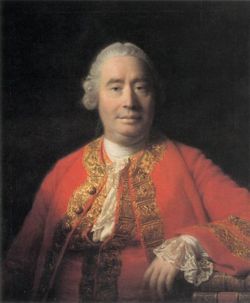David Hume
David Hume (1711-1776) was a Scottish philosopher and historian who promoted materialism and naturalism over spirituality. He was skeptical towards religion, and his major philosophical works include A Treatise on Human Nature, An Enquiry Concerning the Principles of Morals, and Dialogues Concerning Natural Religion. He also wrote an attack against the occurrence of miracles, though it is now believed to be somewhat tautological and also published the wide-ranging History of England, which covered the history of Great Britain from the time of Julius Caesar to 1688. Many of his quotes have survived to this day, including "You can tell what is inside a person's soul by what comes out if it."
Hume has been criticized by many for his atheistic approach, and Charles Darwin declared Hume to have been his central influence, as did "Darwin's bulldog," Thomas Henry Huxley.[Citation Needed]
Hume was one of the first philosophers to rigorously study ontological principles- vital tools of logical reasoning that are commonly used in maths, systemology, philosophy, and theology. He helped develop many of the common logical devices, most notably, Hume's Guillotine and Hume's Fork are named in honor of him.
